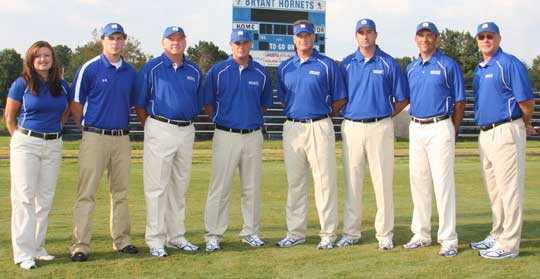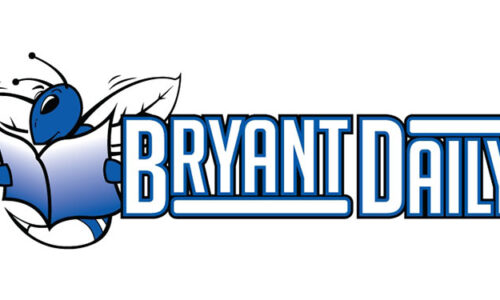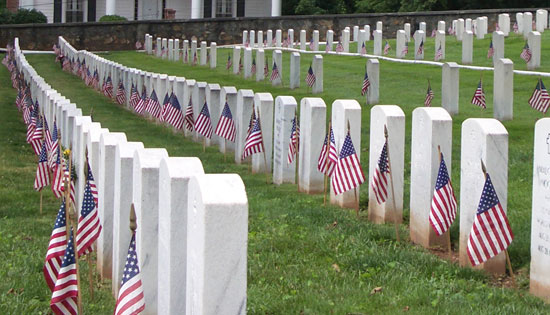 By Rob Patrick
By Rob Patrick
It’s amazing really.
Dale Jones is planning to be back at work late this week or early next.
The 38-year-old is a physical education coach at Collegeville Elementary School and the offensive coordinator for the Bryant Hornets football team. Originally from Cincinnati, he moved to Hot Springs when he was in seventh grade and attended school at Cutter-Morning Star. After graduating from the University of Central Arkansas, he coached nine years at Mayflower High School before coming to Bryant in 2006. He’s the father of two, Ashlyn, 9, and Braden, 5.
And less than two weeks ago — on Tuesday, Jan. 19 — he was undergoing 11 hours of surgery to remove a tumor behind his right ear that was pressed against his brain stem and growing further into his brain.[more]
“I’m ready to go back to work,” he said Saturday. “I go back Tuesday to the doctor to get all my stitches out. My strength’s not where it was before, of course, but if I can go back this week then I’ll have a couple of days off over the weekend to see how I do.”
He said a cold has hampered him as much as anything in recent days.
“The headaches were pretty bad after the surgery,” he allowed. “They eventually dissipated. Before surgery, I was getting headaches that were pretty bad. That was one of my symptoms. I’d get a nightly headache that would last 15 to 45 minutes, just unbelievable ones. Post-surgery, I had headaches and some swelling issues but I think all the swelling’s gone now and most of the headaches are gone.
“I’m not going to be running bleachers anytime soon but I will be eventually,” Jones declared. “Dr. (Ward) Gardner said, ‘You’re 99 percentile in recovery rate. I’ve never seen anything like it.’ He said some people don’t walk, some people have facial issues, some people just don’t recover like I did. He said I was blessed. He also said I had a really good attitude about it so that had something to do with it.”
And he’s had lots of prayers on his side.
“The folks I work with at Collegeville, they had a prayer chain going there and I had folks at the high school praying for me,” Jones related. “I had people at different churches, people I never even met, coaches at other schools, people sending me e-mails. I tell you, it was unbelievable the prayer team I had. I had a big, big support group, my church (Family Church) and people on other campuses and at other schools. I can’t tell you how much I appreciate everybody. I felt like I was in His arms and I didn’t have anything to worry about.”
Though the headaches developed along the way, Jones’ first indication that something was wrong involved a loss of hearing in his right ear. While running during the summer, he’d listen to his iPod.
“Near the end of the summer, I took a pair of ear buds back,” he recounted. “It wasn’t working in my right ear. I got another pair and they weren’t working right either. I was thinking, ‘Man, I can’t get a good pair.’ I took them back too and kind of upgraded what I spent on them. I never thought about switching. The third pair I got, when they didn’t work, I switched them over, right in the middle of running. And it hit me. It was working in the other ear.”
Though that was bothersome, Jones wasn’t too alarmed. “I have two older brothers that live in Cincinnati and one of them has a mild hearing problem and the other one is almost deaf in one ear. I thought, well, it’s hereditary. It’s getting to me. I figured if it got worse or something I’d get it looked at after football season because, by then, we’d started two-a-days.
“Through football, it worsened quite a bit,” he admitted. “I couldn’t hear the other coaches calling me. They’d have to call me twice.”
The final week of the regular season, when the Hornets hosted Little Rock Central, Jones decided to have his hearing checked just to be sure.
“The hearing test indicated I was down to 10 or 15 percent of my hearing,” he said. “(The doctor) thought just like I thought but he said there’s a small chance it could be something else. So he set me up with a specialist that Friday after we played Central Thursday.”
The specialist ordered an MRI and, the Tuesday before the Hornets were set to play Fort Smith Southside in the playoffs, he got word.
“He called me and told me, ’Well, it’s not hereditary. You’ve got a tumor.’ It was a shock. When they say a tumor and it’s deep down in your ear canal and it’s pressing against your brain stem and all the ramifications. I was like, ‘Oh, my gosh!’ Of course, the first thing I asked him was, is it cancerous or benign and he said it was 90 percent that it was benign. But he said, ‘I’m not the expert. I’m just the ear, nose and throat guy.’ He said, ‘I’m going to set you up with a guy that is the top expert in the state on this particular tumor.’
“As you would have it, this guy I actually knew,” Jones continued. “His name is Ward Gardner. He was one of the doctors who did the surgery. He had put tubes in my son’s ears before. He’s an ear, nose and throat guy too but his specialty was this Acoustic Neuroma which is what I had.
“Before I ever met with him, I talked to him on the phone and I asked him again about whether it was benign or not and he said, ‘It’s absolutely benign.’ That put me at peace as much as I could possibly be. He said, ‘I want you to take two weeks and research the heck out of it. There’s a lot of different options out there. In two weeks, we’ll sit down and meet and we’ll decide what we need to decide.’"
It was the week after Thanksgiving by this time.
“I researched it and because it was against my brain stem I found that radiation could cause possible tissue damage. So I ruled that out first,” Jones recalled. “Watching and waiting was an option and I thought real seriously about that for a little while. But the more I researched about the size of the tumor — it wasn’t a large tumor but it sure wasn’t a small tumor either. As I researched I felt real strong about surgery. I prayed a lot about it and I felt at peace with the idea of surgery.”
At the subsequent meeting with Gardner, he not only revealed his decision but which of three options regarding the surgery he preferred.
“He said, ‘Well that’s what I would’ve recommended but I just wanted you to decide for yourself.’ It’s called translab. There are some other surgeries that didn’t give the best view of the tumor to the doctors but they were likely to preserve some of the hearing. But because I was at 10 or 15 percent or less by this time, I felt like why worry about saving the hearing. Why not give the two neurosurgeons and Dr. Gardner the best chance to get this tumor out of there?”
Gardner explained that Jones’ body had already adjusted to not hearing out of the right ear over the previous five or six months and, as it turned out, he’d also adjusted to the fact that the tumor had also destroyed his balance nerve.
“The last month before surgery, I started to notice some minor balance issues,” he recalled. “If I got up out of a chair too fast or got out of the shower wrong. But nothing major. No falling down or anything like that.
“He told me ahead of time that I might have to do so (training) for my balance with walking and running and that kind of stuff. Apparently, my body and my brain had already adjusted for it though. So, the next day after surgery, I was walking down the hall. It’s amazing what the body can do to compensate.”
Jones met with two neurosurgeons. He also sent his MRI to Los Angeles for a second opinion and, after talking to one of the doctors there, that doctor sent it on to a clinic in Louisiana. All agreed that the translab surgery was the best option.
“So I felt like I made the right decision,” he said. “The more I researched the surgeons, it just solidified my decision. One of them had been doing it 28 years and the other one 30 years.”
But there was still plenty of risk.
“The one thing I really prayed up about was this facial nerve,” he mentioned. “When they did get in there, it’d pretty much destroyed my hearing nerve but it also destroyed my balance nerve. They were going to have to cut those for sure anyway, but the main thing that the surgeons were most concerned about — of course, they wanted to get the tumor out — they wanted to stay away from the facial nerve because if they hit or poked or tore or would have to cut it, then there’s paralysis in the face.
“They just didn’t know,” he continued. “They had this little machine they hooked up during surgery to my facial nerve and anytime they got close to it, it would go off, just warning the surgeon.”
The surgery lasted nearly half a day.
“It went about as well as it could go,” Jones said. “To me, it was like falling asleep and waking back up but for everybody else it was a long time. Coach (Jason) Hay and my girlfriend, Cindy, they kept updating everybody and saying, they need three more hours, they need two more hours. Dr. (David) Reding — he’s the finest neurosurgeon in the state, the primary tumor removal guy — and Dr. Gardner did most of the surgical work and Dr. (John) Dickens did some of the work. It was get in there, get the tumor and get out. They got 2.8 centimeters by 2.6 centimeters by 2.1. They left two millimeters on the facial nerve. That’s pretty complete.
“When I woke up, I wanted to know about my face,” he recounted. “And Dr. Gardner, he stuck around. He’s unbelievable. He said, ‘You’ve got 100 percent facial movement, no paralysis whatsoever.’ He said the next day after I slept I might have a little numbness. But when you first come out of surgery, that’s how you’re going to be long term. I had it for a day or two. It went away and I haven’t looked back. I’m just trying to get better.”
And the two millimeters remaining?
“They said there’s not a likely chance of it growing back especially with my age and as strong as I am,” Jones said. “They really felt like the rest will just die. There’s not enough of it to grow. And even if it was to grow, I have a whole lot more options now than I did before because it’s so small.
“I can’t say enough about those three doctors,” he concluded. “They saved my life.”



Everette Hatcher
I was quite shocked to see how well Coach Jones pulled through this surgery. Being in such good physical shape going into to the surgery must have something to do with it and also the many people that love Coach Jones and prayed for him have something to do with it too. Bryant is lucky to have such a fine gentleman coaching their football players. I know that coaches often say to players that football will prepare them to take on the challenges of life but Coach Jones can say that with conviction now and really mean it since he has been through a tougher experience than 99% of those out there have gone through.